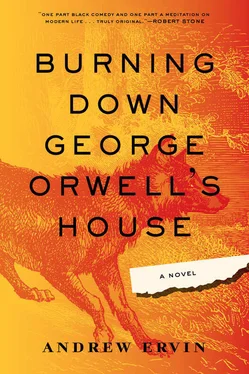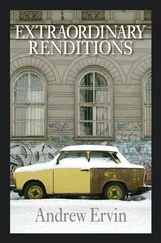“He says it was an accident. And if he did go to jail, who would look after Molly? You?”
“What are you trying to say?”
“That you and I both know that no one here — and I mean no one — will take the word of a stranger over Gavin’s, even though we know you’re right.”
The surface of the road jostled the tiny car, sending pain squirting through his entire system until it settled into one all-encompassing ache that stretched from his groin to his teeth. “That doesn’t bother you?”
“A lot of things bother me, Ray. But that is simply how it is here.”
“We’re talking about attempted murder.”
“You have to let it go, as there are bigger and more important issues at stake.”
“More important than my death?”
“I’ve come to a bit of an insight, if you will. Gavin believes he’s the only one who understands how to maintain our traditional ways, but he may be trying to preserve something that never existed. The best bottle of malt ever produced is worthless if it stays in the bottle. And I’ve spent too many years trying to be accepted as something I already am. I know what you’ve done for Molly, and I want to help. I told her I would smuggle her off the island and help her get to Chicago.”
“Really? What if Pitcairn finds out?”
“In that event, he will most certainly have another attempted homicide under his belt. And even if he lacks the wisdom to understand as much, having Molly get an education is what’s best for her and what’s best for this island in the long run. The big picture here is the only picture worth attending to. I’m a historian, I’ll have you remember. That girl doesn’t belong here right now any more than you do. You’re not cut out for life on Jura — this isn’t exactly a theme park.”
“So I’ve learned,” he said. “What about you — do you belong here?”
“Aye, of course I do, even if not everybody appreciates that fact just yet. And if it’s my lot to be treated as an outsider on the only home I’ve ever known, so be it. And speaking of home — Mrs. Bennett tells me that a young couple keeps ringing up from London hoping to hire Barnhill.”
“She told me the same thing just now. It sounds like she wants to get rid of me.”
“No, we hate Londoners as much as Americans, but it does sound like they’d be willing to take over the lease. They’re apparently very keen on it. You might even make a profit on the deal.”
“Is that what you think this is about — making a profit?”
“Not really, that’s just something one says to Americans. She also sent along some wellies. They’re in the back. You can pay her whenever it’s convenient. Here we are.”
Farkas stopped at the end of the road. Ray climbed out and leaned on the open door to collect his strength for the walk ahead of him. “I appreciate your advice, Farkas. You’re right. Maybe it is time to go home.”
“I brought you a little get-well gift,” he said. He reached into a bag on the seat behind him and produced a bottle. The handwritten label said 1984.
“1984?” he asked.
“That’s when it was distilled. It’s an extremely rare whisky. I put a small batch aside because of that year’s significance to our merry little island. May it treat you well.”
“I don’t know what to say.”
“How about, slàinte?”
“Slàinte, Farkas.”
“You get yourself better now. I’ll stop by in a few days, see how you’re holding up.”
The little car puttered away, back toward Ardlussa and Craighouse. Ray fingered the shape of the bandages under his clothes, the strips of cotton and medical tape holding his insides inside. It hurt so much. If he opened the bottle and drank a gulp, would whisky trickle out his wound and further stain his sweater? For the first time in months, years maybe, he had no desire for a drink.
The hike homeward took forever and each step hurt more than the previous. He clutched the bottle of scotch and his new boots — they looked comfy and dry, but he couldn’t bend over to put them on. The sky blazed in a spectrum of blues and watched over its own reflection in the sound. By the time he arrived at the crest and Barnhill came into view, it had ceased to be George Orwell’s house and had become his own. He had never felt more up to the challenge of being himself.
He was tempted to take a long nap, but lying down and getting up again would be way too painful. He made it to the kitchen for a glass of water and found a sunny spot in the sitting room to read his mail. With some reluctance he opened the strangely shaped envelope made of green paper reminiscent of the papyrus an intern once brought him from Egypt. The return address was printed with soy ink in a curling font designed to appear earthy and earnest and it came from an organization called the Ethos Co-Op of Chicago, Illinois. Before he opened it he knew that it contained a job offer from Bud.
He had not, however, expected the check made out in his name for $50,000.
Bud’s letter began “Dear Raytard” and detailed how his former friend had been so inspired by Ray’s bold decision to move to Scotland that he had arrived at an epiphany concerning the inherent evil of the business model at Logos. Bud had quit his job and opened his own agency, one organized around the principles of ethical responsibility and environmental awareness. Ethos Co-Op dedicated itself to working for progressive companies that focused on issues of local and global sustainability. He wanted Ray to sign on as executive vice president.
The case for returning to Chicago had become more persuasive, though it didn’t pass his notice that the word “nonprofit” was nowhere to be found in the letter.
“I traded in my SUV,” Bud had written. “Can you picture me driving a hybrid! Reuse recycle and all that shit. Please accept this offer. Ethos needs you.”
Ray sipped from his glass and remembered that it contained only water. The scotch had been such a constant in his life that it felt odd to drink anything else. He tucked Bud’s letter back into its envelope and placed it on the mantel instead of in the pile of kindling. There was another greeting card from his mother. The airmail stamp had been cancelled with a brown splotch of his own blood.
He spent the day drinking tea, of all things, and rereading the end of Nineteen Eighty-Four . Something felt different about the text this time. Something was different. It seemed too convenient to attribute the change to his near-death experience, but it was clear now that he had been so wrong about that book. He saw it now. The appendix to Nineteen Eighty-Four , the infamous and thorny essay “The Principles of Newspeak,” was in past tense. That meant it was set after the demise of the entire Oceania empire. The appendix hinted at a world after Big Brother.
Orwell was an optimist after all.
Flora was right.
The end of Nineteen Eighty-Four suggested that all the degraded conditions and noise pollution and invasions of privacy people put up with every single day — it could all eventually end. Even after the builders whitewashed over Flora’s graffiti, her message would remain there, hidden yet waiting to get read again some distant day after the current and all-too-real version of Big Brother disappeared.
He put Orwell down and reread the letter from Bud. The physical sensation of holding the check in his hand was not enough to convince Ray of its existence. He stayed up half the night considering his options.
When Molly showed up a few days later, his belongings were packed and Barnhill’s floors mopped clean. She had carried a picnic basket on her new bike, freshly arrived from a mail-order company in Oban, and let herself in without knocking. Ray was fully clothed this time. He sat in the kitchen sipping a cup of black tea.
Читать дальше












